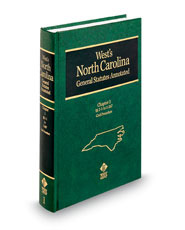
Use these search terms to help you find more information on the North Carolina Constitution in our online catalog.
![]() Email a member of the reference staff at referencelaw@nccu.edu.
Email a member of the reference staff at referencelaw@nccu.edu.
Students submit help requests here.
Faculty and staff submit help requests here.

North Carolina has one unified statewide court system. Most people who go to court are in State courts. The system is divided into district, superior, and appellate divisions.
NORTH CAROLINA TRIAL COURT DIVISION
| District Courts |
Civil cases, cases involving less than $10,000, misdemeanors and infractions are heard in District Court.
|
|
Felony criminal cases, civil cases involving more than $10,000, and misdemeanor and infraction appeals from District Court are heard in Superior Court. |
NORTH CAROLINA APPELLATE COURT DVISION
| Court of Appeals |
The state's intermediate appellate court. Fifteen judges in rotating panels of three that decides questions of law on cases appealed from Superior and District courts. |
| Supreme Court |
North Carolina's highest state court. There is no further appeal in the state from its decision. |
NORTH CAROLINA FEDERAL COURT SYSTEM
The State court system is different from the Federal court system, which handles federal matters, including crimes that occur across state lines or on federal land.
The North Carolina Federal court system is broken down into the District (trial) level, Circuit (appellate) level and the Supreme Court.
At the District level, which is where trials are held, there are three districts: Eastern, Middle and Western.
If any party from a case appeals from the decision at the district level, that appeal will likely go to the Fourth Circuit.
Appeals from the Fourth Circuit go to the United States Supreme Court.

Preamble of the North Carolina Constitution
"We, the people of the State of North Carolina, grateful to Almighty God, the Sovereign Ruler of Nations, for the preservation of the American Union and the existence of our civil, political and religious liberties, and acknowledging our dependence upon Him for the continuance of those blessings to us and our posterity, do, for the more certain security thereof and for the better government of this State, ordain and establish this Constitution."

PRINT RESOURCES
 West's North Carolina general statutes annotated
by
West
West's North Carolina general statutes annotated
by
West
 The Constitution of the State of North Carolina
by
- Henry G. Connor and Joseph B. Cheshire, Jr.
The Constitution of the State of North Carolina
by
- Henry G. Connor and Joseph B. Cheshire, Jr.
Disclaimer: The NCCU Law Library does not endorse or warrant the services provided by any of the groups, organizations, or offices listed below. The NCCU Law Library also does not warrant the accuracy of the information provided on this list. The information below is provided as a service to the community. This is not an exhaustive list. The NCCU Law Library does not endorse or warrant the services provided by any of the groups, organizations, or offices listed below. The NCCU Law Library also does not warrant the accuracy of the information provided on this list.
Many law schools offer legal clinics where law students, under the supervision of attorneys, provide pro-bono legal services to under resourced community members in a variety of fields of law. Please note, some of the legal clinics below do not accept cases directly from the public.